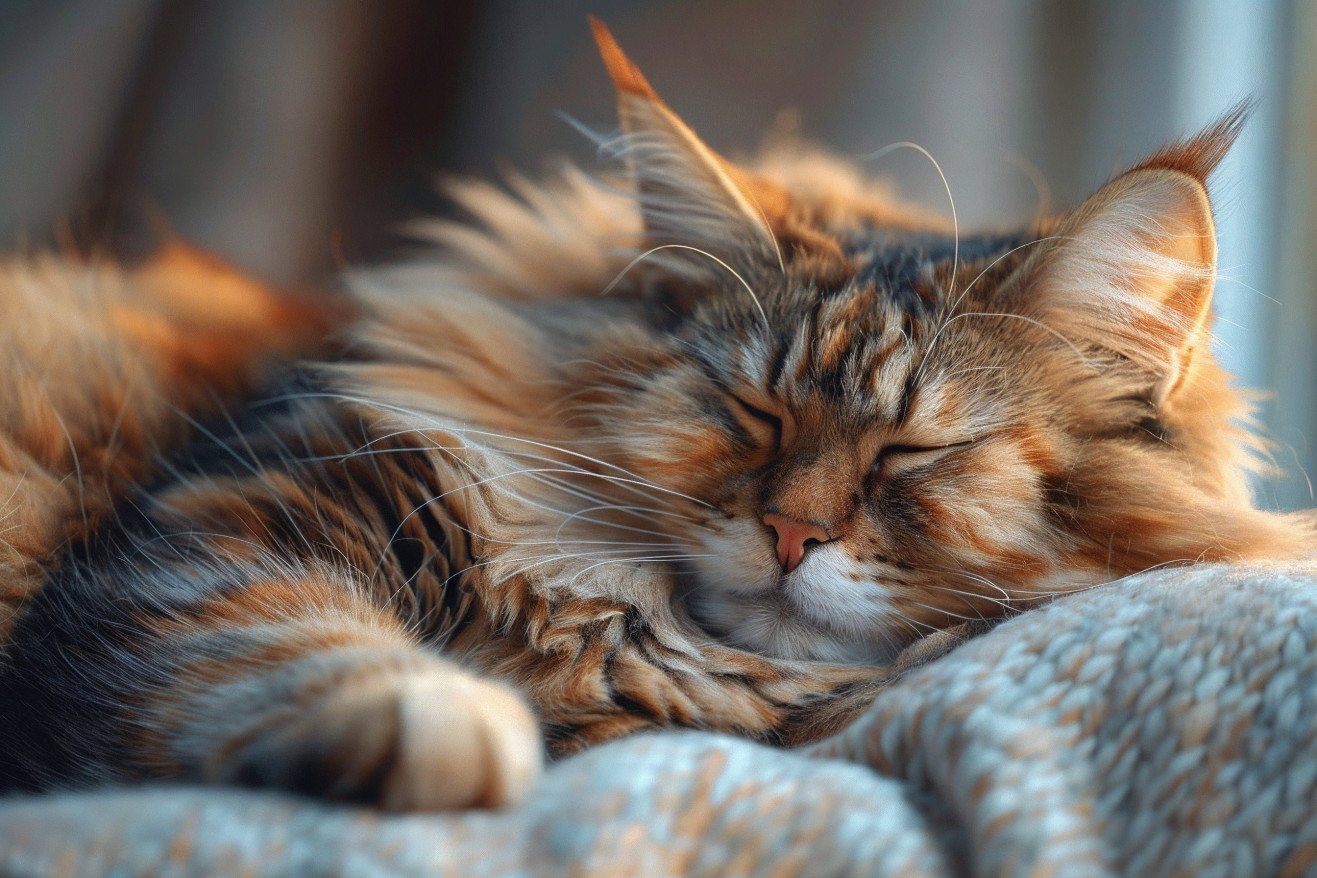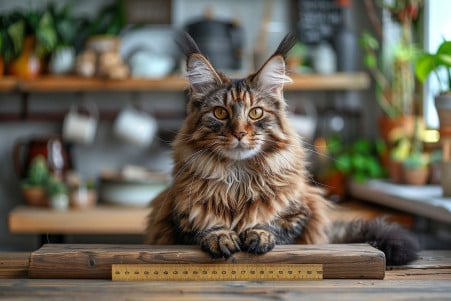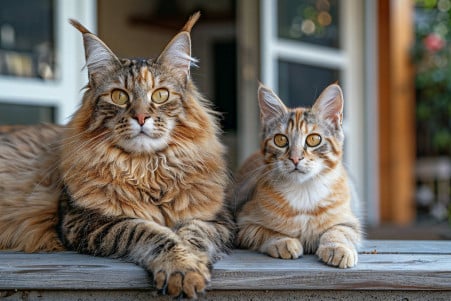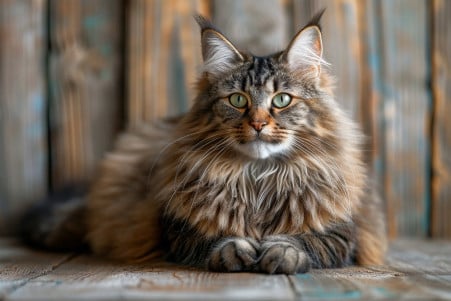Maine Coon Cat Weight: How Big Do These Gentle Giants Get?
9 April 2024 • Updated 9 April 2024

If you're curious about how much a Maine Coon cat weighs, you're not alone. After all, this breed is one of the largest in the world. On average, male Maine Coons weigh between 13 and 18 pounds, while females weigh between 8 and 12 pounds as adults. That said, some Maine Coons weigh more than 20 pounds, but it's important to note that obesity can cause health problems, so it's important to keep your cat at a healthy weight through diet and exercise.
To learn more about the size and weight of this beloved breed, we'll look at information from veterinary references, breed organization standards, and research studies that have looked at everything from Maine Coon growth rates to the weight ranges that are best for these cats. This information will help you understand why Maine Coons are so big, how to make sure your cat is at a healthy weight, and how to make sure you're feeding your cat properly as they grow from kittens to adults.
How much do Maine Coon cats typically weigh?
Maine Coon Kitten Growth: From Birth to Beautiful Adult Cats
Maine Coon kittens go through an amazing series of changes in their first year. As reported by PetHelpful News, Maine Coon kittens grow quickly, gaining 1-2 lbs a month. They start out nursing from their mother and eventually move on to a diet of wet and dry food, according to the kitten care guide from SassyKoonz.
By 12 weeks of age, Maine Coon kittens are usually ready to be adopted, having been socialized by their mother and people. This socialization is important for the kittens to grow up to be well-adjusted cats, as noted in the SassyKoonz guide.
Maine Coons go through three growth stages, kittenhood (0-6 months), adolescence (7-12 months), and adulthood (1-5 years), according to Kritter Kommunity. It's important to make sure the cats' needs are met in each of these stages, including providing a healthy diet, a safe home, and socialization, which is especially important in the early stages of life.
Maine Coon kittens go through several growth stages in their first year, according to the growth chart guide from Cat Product Guide. From the neonatal stage to the juvenile and adolescent stages, the kittens grow and develop, gaining skills, losing their baby teeth, and becoming more and more independent. They continue to grow to their full size over the next few years with the right care and feeding.
Grooming Essentials: How to Care for Your Maine Coon's Long, Silky Fur
Maine Coons have a long, but not overly long, coat that needs to be brushed regularly to keep it in good shape. As explained by Maine Coon Cat Nation, their fur is shorter on the shoulders and back and longer and heavier on the lower body, so it needs to be brushed regularly to prevent matting and tangling. Grooming Maine Coon kittens from a young age and using positive reinforcement can help make the process easier, according to the Catster guide.
According to wikiHow, essential grooming tools for Maine Coons include a FURminator, soft bristle brush, nylon brush, and nail trimmers. In addition to brushing, Maine Coons will likely need to be bathed, have their nails clipped, and their teeth brushed more often than short-haired cats, according to the Catster article. However, regular grooming will help keep their coats healthy and shiny, and ensure these affectionate cats always look and feel their best.
Personality Traits: Why Maine Coons Are Such Special Pets
Maine Coons are beloved for their sweet, sociable nature and their tendency to bond closely with their human family members. The Spruce Pets notes that these smart, outgoing cats are often "dog-like in their loyalty and affection towards their human companions."
As explained by Cat Evolution, Maine Coons are good with kids and other animals, which makes them great family pets. They are also playful and inquisitive, so they enjoy toys and activities that challenge their intelligence and keep them mentally engaged.
In addition, Maine Coons are known for their hunting prowess and have been used as mousers for centuries, according to Bow Wow Insurance. All of these traits combined mean that Maine Coons are loyal, loving, and curious, which makes them a one-of-a-kind addition to any home.
Health Considerations: How to Help Your Maine Coon Thrive
Maine Coons are genetically predisposed to certain health problems that will need to be managed with care. For example, WebMD reports that about 30% of Maine Coon cats have a gene that makes them more likely to develop hypertrophic cardiomyopathy, a condition that causes the heart muscle walls to thicken and interfere with the heart’s ability to pump blood. Maine Coons are also more likely to develop hip dysplasia, a genetic condition that causes the hip joint to be misaligned and leads to osteoarthritis, according to PetHelpful.
In addition, Untamed points out that Maine Coons can also develop spinal muscular atrophy, a genetic condition that affects the cat’s posture and gait. Regular visits to the vet are important to catch and address these issues early.
In addition to regular vet visits, a healthy diet, dental and nail care, and regular vaccinations and deworming are important for keeping Maine Coons healthy, according to WebMD. In addition, lifestyle issues like obesity and lack of exercise can also lead to health problems like diabetes and joint issues in Maine Coons. However, with regular vet care and a focus on their health, Maine Coon owners can help their cats live long, healthy lives.
Conclusion: Celebrating the Majestic Maine Coon Cat
Maine Coons are truly one-of-a-kind cats, and their large size, friendly nature, and unique physical characteristics have made them one of the most popular and beloved breeds in the world. While their size and semi-long coats require a bit more care and attention than some other breeds, Maine Coons are wonderful pets for families and individuals alike.
By learning about their typical weight ranges, growth patterns, grooming requirements, and common health problems, cat owners can ensure that they're providing the best care for these regal cats. With their intelligence, sociability, and loving temperament, Maine Coons have become one of the most popular and sought-after cat breeds.
Whether you're an experienced cat owner or thinking about bringing a Maine Coon into your home, these gentle giants are sure to win you over with their majestic presence and affectionate nature.


